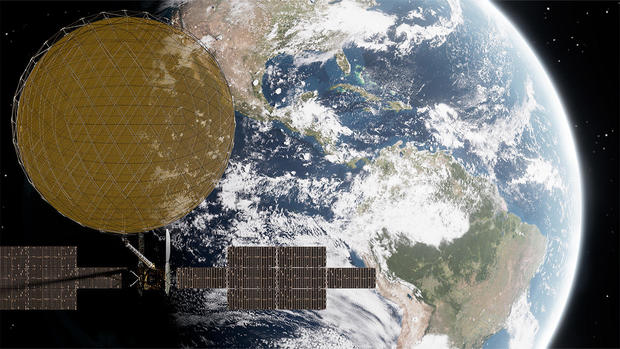Viasat reveals problems unfurling huge antenna on powerful new broadband satellite
A next-generation Viasat communications satellite launched atop a SpaceX Falcon Heavy rocket on April 30 has run into problems deploying its huge mesh antenna, a key element in the relay station's ability to provide hemispheric access to high-speed internet, company officials said.
In a statement posted Wednesday, the company said "an unexpected event occurred during reflector deployment that may materially impact the performance of the ViaSat-3 Americas satellite."
"Viasat and its reflector provider are conducting a rigorous review of the development and deployment of the affected reflector to determine its impact and potential remedial measures," the statement said.
If the primary antenna cannot be coaxed into position, the satellite cannot operate as required.
Viasat shares plunged sharply Thursday in the wake of the announcement.
The first ViaSat-3, launched last April, was expected to provide space-based internet access to customers in the western hemisphere starting this summer. Two more satellites covering Europe, Africa, Asia and the Pacific are expected to launch over the next two years.
Capable of handling up to 1 terabyte of data per second, the satellites are equipped with the largest dish antennas ever launched on a commercial spacecraft. Each satellite's reflector is designed to deploy atop a long boom.
In a pre-launch interview, David Ryan, president of space and commercial networks for Viasat, said the size of the mesh antenna is proprietary, but "it's very big. It goes out on a retractable boom that takes literally days to deploy. The boom's in the range of 80 to 90 feet (long). So it's a big antenna."
It takes the shape of a parabolic dish when fully deployed, "and that reflects the energy up to the rest of the satellite, up to our antenna feeds and then the satellite and communicates with the rest of our gateways on the ground."
ViaSat built the relay station's communications equipment while Boeing supplied the satellite that carries it. Viasat has released few details about the antenna, but Ryan indicated it was supplied by Northrop Grumman's Astro Aerospace.
"It is a design that is based on previous designs, in this case from Astro, that have flown on Inmarsat ... and other systems," he said. "So this is a modification of that system, just bigger."
Mark Dankberg, chairman and CEO of Viasat, said in the company statement, "We're disappointed by the recent developments. We're working closely with the reflector's manufacturer to try to resolve the issue. We sincerely appreciate their focused efforts and commitment."
The company statement said current customers will not be affected by the antenna issue and that a subsequent ViaSat-3 may be relocated "to provide additional Americas bandwidth. The initial service priority for ViaSat-3 Americas has been to facilitate growth in the company's North American fixed broadband business."




